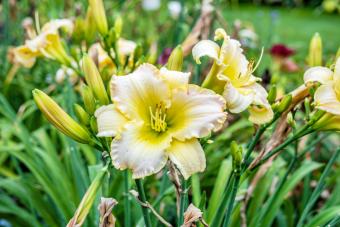Frame the Front Door

The front door is the focal point around which all other elements of the front yard revolve. Here, the sinuous border between the lawn and flower bed flows towards the door and beautiful birch trees frame it with informal symmetry.
A Straightforward Approach

Straight lines and right angles have a place in front yard design. Especially if the driveway goes around to the back of the house, a solid, direct path to the street has functional importance. In this yard, the placement of a dogwood tree complements the formal entry and balances the asymmetrical form of the house.
Multiple Layers and Loose Lines

Visual depth is achieved with multiple layers of vegetation and curving lines. This landscape has lots of vegetation and zero symmetry, a nice balance to the formal architecture of the home. Skillful pruning is important to keep each group of plants in a defined space to prevent the landscape from looking cluttered.
Accentuate the Vertical

The facade of this home would be incomplete without the pair of blue spruces that fill a large vertical niche. They are just the right size and color and their conical form is mirrored nicely with the two evergreens framing the front door.
Match the Architecture of the House

An unruly cottage garden is the best compliment to a quaint country cottage and a home featuring Japanese architectural elements should be showcased with an Asian-inspired landscape. This front yard demonstrates this principle perfectly, pairing bromeliads and arid-looking palms with the home's terra cotta roof tiles and stucco facade.
Sculpt the Earth

Flat landscapes beckon for a mound and dip here and there to make things more interesting and to create a variety of niches for plants and other landscape elements. This front yard embodies the idea in a dramatic fashion by using giant boulders to frame a small hill planted with a grotto of birch trees.
Tasteful Terracing

Where the landscape comes with a slope, divide it up creatively with small retaining walls. Here the use of natural stone has allowed for intricate curves and a smooth interface with pathways and planters. Interlocking concrete blocks are another option to achieve the same effect.
Soften Straight Lines

Houses, sidewalks, driveways and fencelines usually come in straight lines with lots of right angles, making plant design the place to soften all those hard edges. This simple example shows how curving the border between two planting areas is a pleasing complement to the straight lines of the house.
Landscaping All the Way to Front Door

Container plantings on the front porch create a smooth transition between the yard and the front door. Use pots, planters and urns that match the exterior decor of the house and fill them with a combination of evergreen perennials and annual flowers for a year-round display.
Sign up for our newsletter featuring all the latest stories and products we love.
Fill Corners With Color

Empty right angles - where the lawn meets the driveway and street, for example - beckon for a focal point. This could take the form of a mailbox surrounded with a colorful bed of annual flowers or, as this yard demonstrates, it is the perfect location for a small flowering tree.
Highlight the Home With Plants

Plants in the front yard don't have to be restricted to growing on the ground, as the house itself can serve as a canvas for vegetation. This works best when plants are trained to parallel to the architectural lines of the home, as seen here with a massive wisteria vine draping the front porch.
Use the Hardscape to Its Fullest Potential

The non-plant components of the front yard - the driveway, paths, fences, arbor, walls, etc., collectively known as the hardscape - are important elements of the overall design and should be coordinated to match the exterior of the home, as seen in this historic brick house with a rustic brick-paved driveway. In very small front yards, the hardscape may be the dominant feature, so it pays to make the most of it.







